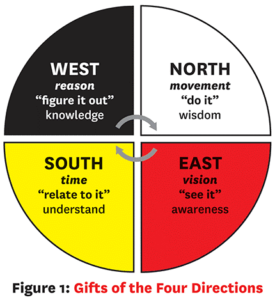Photo by Yeshi Kangrang on Unsplash
“We need to move beyond the idea that an education is something provided for us, and towards the idea that an education is something that we create for ourselves.”- Stephen Downes
Indigenization is best described as “the transformation of the academy”. (Pete, 2016). When we explore the notion of decolonizing curriculum, we promote the notion of indigenizing curriculum. I feel that both decolonization and indigenization go hand in hand. The notion that we challenge the replication of dominant ways of knowing. Historically, our colonial education system has always been one in which we follow, do not question, as we “check boxes” to meet the status quo. If we say our plan is to decolonize BC Curriculum, we need to acknowledge the importance of not just simply adding indigenous content, but rather challenge the colonial dominance we have come to recognize as “normalized” education.
While I agree that it is important that we move forward, focusing on decolonizing educational spaces, we need to be cognizant that we are not over indigenizing curricula. As we recognize the importance of the cultural tapestry that makes up British Columbia, we run the risk of implementing a disingenuous curriculum that borders on tokenism which is not what decolonization and indigenization is about.
In our classrooms we explore curriculum as a well- known concept. This curriculum that we use, dictates what we teach and what our students learn. What has been labelled as the “new curriculum” for many classroom teachers is reinvented curriculum and implementation ideas that have been used for many years. While I don’t think all of the “old” curriculum is invalid or no longer useful, I do think that we need to include a curriculum that recognizes the strengths of all peoples and that creates space for conversations. It is so important that every student we teach, see themselves reflected in the diversity in which we live.
Shauneen Pete explores in her article, Decolonizing Our Practice- Indigenizing Our Teaching, that in order to decolonize education we need to indigenize it, in a way that re-centers and asserts indigenous knowledge within the subjects we teach. (Pete, 2013). She speaks to the importance of decolonizing ourselves, our classrooms and curricular content. She does this by drawing upon the use of indigenous scholars, by recognizing and confronting privilege as well as confronting racism. I think she brings up a really valid point, in that much or what we have seen in mainstream curriculum is evidence of institutional racism. The misguiding’s of our curriculum with what we teach about Canadian history, as well as the lack of representation of indigenous content leads to the colonial oppression. When we decolonize the curriculum by indigenizing our teachings, we need to be purposeful with how we confront racism and stereotypes.
To explore this further I would encourage you to look at the following resources:
Battiste, M. (2013). Decolonizing Education: Nourishing the Learning Spirit. Saskatoon: Purich
Publishing Limited.
King, T. (2013). The inconvient Indian: A curious account of Native people in North America:
Toronto: Anchor Canada.
King, T. (2003). The truth about stories: A Native narrative. Toronto: House of Anansi Press.
Pete, S. (2016). 100 Ways: Indigenizing & Decolonizing Academic Programs. Aboriginal Policy
Studies, 6(1), 81–89. https://doi.org/10.5663/aps.v6i1.27455
Pete, S., Schneider, B. & O’Reilly, K. (2013). Decolonizing Our Practice- Indigenizing Our Teaching. First Nations Perspectives 5, (1), 99-115.
I would also encourage you to look at the contributions of Jo Chrona, who has been instrumental in the transformation of the BC Curriculum, especially where indigenous education is concerned. A sample of Continuing our Learning Journey: Indigenous Education in British Columbia- Module 1 can be found here in this YouTube video:
https://www.youtube.com/watch?v=o-pQ_UqBwkI&feature=youtu.be
https://firstpeoplesprinciplesoflearning.wordpress.com/about-the-author/


Recent Comments